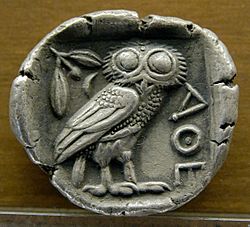
Back بومة أثينا Arabic Kuwaw ni Atenea BCL Mussol d'Atena Catalan Eule der Minerva German Mochuelo de Atenea Spanish جغد مینروا Persian Minervan pöllö Finnish Chouette d'Athéna French Moucho de Atenea Galician הינשוף של אתנה HE

In Greek mythology, a little owl (Athene noctua) traditionally represents or accompanies Athena, the virgin goddess of wisdom, or Minerva, her syncretic incarnation in Roman mythology.[2] Because of such association, the bird—often referred to as the "owl of Athena" or the "owl of Minerva"—has been used as a symbol of knowledge, wisdom, perspicacity and erudition throughout the Western world.[3][4]
- ^ Grabham, Sue (1995). "Greece: People and History". Encyclopedia of Lands & Peoples. London: Kingfisher. p. 105. ISBN 1-85697-292-5.
- ^ Eason, Cassandra (2008). Fabulous Creatures, Mythical Monsters, and Animal Power Symbols: A Handbook. Westport, CT, USA: Greenwood Publishing Group. p. 71. ISBN 9780275994259.
The Roman goddess of wisdom Minerva has the owl as her sacred creature, as does her ancient Greek counterpart Athena. Athena was often depicted with an owl, which was considered a symbol of wisdom in both cultures. The best known image of Athena's owl, the Little Owl, is seen on ancient Athenian coins dating from the fifth century BCE. To the Romans an owl feather placed near sleeping people would prompt them to speak in their sleep and reveal their secrets. However, in Rome the owl was considered a harbinger of death if it perched on a roof or on a public building and hooted. The deaths of several Roman emperors, including the assassination of Julius Caesar, were signaled by an owl landing on the roof and hooting.
- ^ Berger, Cynthia (2005). Owls. Mechanicsburg, PA, USA: Stackpole Books. p. X. ISBN 9780811732130.
Minerva's owl wisdom.
- ^ Deacy, Susan J.; Villing, Alexandra (2001). Athena in the Classical World. Leiden, Netherlands: Brill. ISBN 978-9004121423.
© MMXXIII Rich X Search. We shall prevail. All rights reserved. Rich X Search